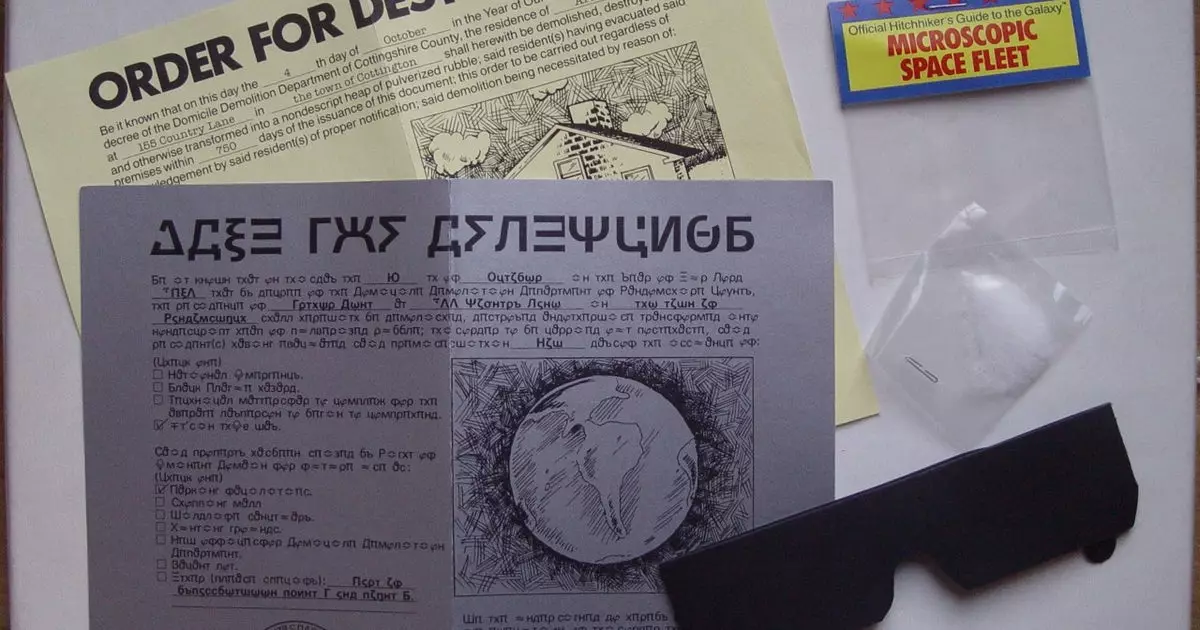In an era rife with the commercialization of video games, it’s refreshing to revisit a time when the experience was enriched by seemingly useless items that fostered imagination and engagement. This nostalgia was ignited when discovering the innovative concept of “feelies” introduced by Infocom, a pioneering company in the text adventure genre. Their 1984 title, *The Hitchhiker’s Guide to the Galaxy*, beautifully embodies this ethos, combining gameplay with tangible objects that added layers of interaction. The notion that a simple label in a plastic bag could be a part of a grand narrative captures an essence of gaming that feels compellingly lost in today’s hyper-commercial landscape.
Feelies, as Scott Krol noted, were not just gimmicks but expressions of creativity that enhanced the storytelling experience. They served as artifacts of engagement, inviting players into a deeper relationship with the narrative. Imagine meticulously sifting through a thin plastic bag, experiencing the anticipation of not knowing what lies within, which starkly contrasts with the current gaming environment that often lays everything bare, diminishing the excitement of discovery. These tokens were humble yet captivating, turning the act of playing into an exploratory journey rather than a compulsory task driven by the latest marketing crusade.
Arthur Dent: A Cosmic Everyman
The exploration of Arthur Dent’s character in *The Hitchhiker’s Guide to the Galaxy* offers yet another layer of appreciation—one that transcends mere gameplay and taps into profound human experiences. As articulated in Victoria Regan’s insightful reflection, Dent’s character serves as a representation of every individual’s struggle against chaos in the universe. His willingness to face absurdity head-on demonstrates an unexpected courage, which many players can relate to in their own lives.
This perspective flips the typical narrative on its head; instead of merely viewing Arthur as a bumbling everyman, we can understand him as a symbol of stoic resilience against the overwhelming randomness of existence. This deeper characterization provides a refreshing lens through which to analyze the story and the human condition itself. In a world where cynicism often reigns, particularly in video games, Arthur’s confrontations with the universe encapsulate truths about bravery and perseverance that are sorely needed.
The Diminishing Magic of Discovery
The sentiment of unearthing hidden treasures in old games ties into a larger conversation about the current state of the gaming industry, where new titles are dissected and analyzed to the very core within moments of release. The intrigue of personal exploration and unique experience has been systematically eroded by rampant information dissemination and consumerist expectations. Regan and her brother’s drive to uncover secrets within the confines of an obtuse adventure game serves as a stark contrast to the certainty that modern players face.
Today’s players often find themselves ensnared by overhyped marketing or bombarded with spoilers and leaks, robbing them of that joyous, serendipitous gameplay experience. This highlights a troubling trend: the standardization of game-related merchandise and collectibles has led to repetition and predictability, thereby stifling the inherent creativity that once flourished. The allure of uncovering something unique and personal in a game’s narrative has been overshadowed by the mechanical nature of collecting statues and other branded memorabilia that cater to a demographic rather than to genuine passion.
Embracing Uselessness: A Call for Creative Freedom
As the dialogue shifts toward embracing whimsically impractical collectibles, there is a call for a renaissance in how we view video game ephemera. Our attachment to richly layered narratives should usher in more items that reflect inquiries rather than answers—articles that prompt discussion instead of dictating lore. The charm of collecting “tat” that acknowledges its own triviality invites a return to authenticity in gaming culture.
Games should celebrate the beautiful chaos that life represents, fueling our collective imagination with objects that, while perhaps functionally useless, carry the weight of significance—a tangible link to the stories we cherish. Reducing collectibles to mere status symbols does a disservice to the wealth of ideas and relationships that games can foster. So here’s to more feelies, more prompts for personal exploration, and a culture that thrives on the beautifully unstandardized remnants of play.

